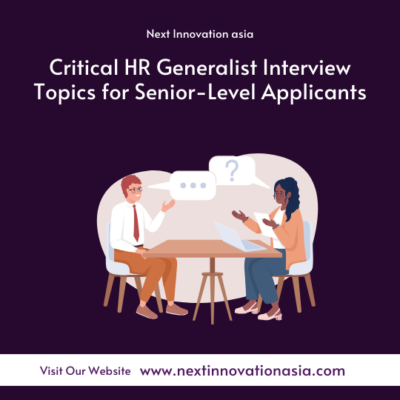For senior-level HR Generalist roles, interviewers seek candidates who can seamlessly manage core HR functions while contributing strategically to business goals. Here’s a breakdown of critical topics often explored during interviews for seasoned professionals:
1. Strategic Workforce Planning
- Aligning talent acquisition with organizational goals.
- Anticipating future workforce needs through data-driven insights.
- Implementing diversity, equity, and inclusion (DEI) initiatives.
2. Advanced Employee Relations
- Handling complex employee grievances and resolving conflicts.
- Fostering a positive work culture while ensuring policy adherence.
- Managing sensitive terminations or performance improvement plans.
3. Compliance and Risk Management
- Ensuring compliance with labor laws and regulations (local and global).
- Designing and implementing policies to mitigate HR-related risks.
- Conducting internal audits to address compliance gaps.
4. Leadership in Change Management
- Leading HR initiatives during mergers, acquisitions, or restructuring.
- Managing employee communication and engagement during transitions.
- Training managers to handle organizational changes effectively.
5. Performance Management Systems
- Developing and implementing robust performance appraisal processes.
- Creating metrics to measure employee and team performance.
- Driving a culture of continuous feedback and development.
6. Compensation and Benefits Strategy
- Structuring competitive salary and benefits packages.
- Conducting market analysis to maintain pay equity and fairness.
- Introducing innovative benefits to attract and retain top talent.
7. HR Technology Proficiency
- Managing HRIS platforms for efficient HR operations.
- Leveraging data analytics to track HR metrics and performance.
- Streamlining processes with automation and digital tools.
8. Crisis and Conflict Resolution
- Leading HR responses during organizational crises (e.g., layoffs, PR issues).
- Mediating high-stakes conflicts between senior leaders or teams.
- Ensuring employee well-being during challenging times.
9. Talent Development and Succession Planning
- Building career development frameworks for employees.
- Identifying high-potential employees for leadership roles.
- Designing mentorship and training programs to upskill teams.
10. Business Acumen and Cross-Functional Collaboration
- Aligning HR strategies with business objectives.
- Collaborating with department heads to support organizational growth.
- Providing HR insights to guide executive decision-making.
Conclusion:
Excelling as a senior-level HR Generalist requires a strategic mindset, in-depth HR expertise, and the ability to drive organizational success. By mastering these critical topics, you’ll be well-prepared to tackle interview questions and showcase your ability to lead HR initiatives at a senior level.

